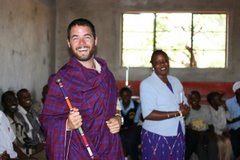The Kenyan secondary school curriculum is standardized. The English book, for instance, goes so far as to dictate which lessons should be taught every week of the year. Any deviation from the prescribed national syllabus is strictly prohibited. But sometimes even within such a restricted educational regiment, kernels of creativity show up.
The Form 1 English book includes two lessons on Martin Luther King's most famous "I have a Dream" speech. There is an edited version of the text, a tedious fill in the blank exercise that requires little more than rewriting the text, and a discussion exercise to be done in groups of four. I could not stop myself from giving the students simple context for the Civil Rights era in America at the start of the first lesson. I drew a crude chalk map of the U.S. and pointed out where Georgia and Mississippi are, explained the term segregation and talked about its roots, and gave a brief history of slavery and the American Civil War. I read the speech to them, they read it to themselves, and I asked the classic questions, "Has Martin Luther King's dream been realized?" and "Is there equality between races now?" The responses were thoughtful and we had an engaging conversation before we forced our minds back into the cookie cutter curriculum. "Yes, there must be equality because you are here teaching Mr. James," one student sweetly said.
When the book exercise asked the class to discuss their own dreams for Kenya in groups, I had to go one step further and make them write their own speeches as well. And I will treasure the texts that came out of this deviant creative writing project and the video I took of some of the students delivering their orations. I even have hand written copies of twenty five speeches to bring home with me.
"I have a dream that one day girl's education would be looked at with great interest. Our young girls who are tomorrow's future are being married with older men. I do hope that some years to come this terrible ordeal will come to an end." - Rahab Wanjiru
"I have a dream that all Kenyans will live in harmony in houses such as bungalows, detached house and semi detached house. Its my dream that all the forty three tribes will come together and call each other brother and sisters and practice socialism as our neighbor Tanzanians do."- Josephat Kariuki
"I have a dream that some day coming Kenya's education will be free from secondary up to university. So people will be learned and some years coming all citizens will have knowledge and there will be no such things as female circumcision." - Lucy Gathere
"I have a dream that one day in our country Kenya corruption will come to an end and all people in high level will love people in low level and see them just like brothers and sisters and treat them fairly." -Miriam Ndinda
Monday, April 2, 2007
Shakespeare
The Merchant of Venice is full of touchy topics like anti semitism, that I knew, but teaching the play in a Kenyan village school brought out controversies to converse about that I am quite sure Shakespeare never imagined. Portia, the story's heroine, is beset with suitors who want to try their hand at winning her as a wife. She does not, however, have a choice over her future husband, rather she is forced to marry the man who solves the test her late father has left behind. It is an arbitrary challenge to select one of three caskets, like a contestant selecting what's behind door number three on a game show, that the men have to conquer in order to wed the richest girl in Venice.
Portia voices her discomfort, "O me, the word 'choose!' I may neither choose whom I would nor refuse whom I dislike; so is the will of a living daughter curbed by the will of a dead father. Is it not hard that I cannot choose one nor refuse none?" And it occured to me, in the midst of prepping a lesson, how like Portia my young female students were. It is the common practice of both Maaisai and Kikuyu families to marry their daughters off at exceptionally young ages to older men, without giving the girl any voice in the selection or the timing. Often these girls are taken from school, kidnapped either figuratively or literally, and married at twelve and thirteen years of age to men twice their age. It rarely seems to occur to the men in the society that this tradition is stealing the best years of a child's educational life or that girls deserve a right to "choose whom they would or refuse whom they dislike." Even one of the teachers at Oloile, a funny and energetic man named Mr. Mirie, admitted to me that his wife of seven years is now 19 years old, a secondary school aged student herself with a child in primary school. And it is hard not to mention the lack of choice these same girls have in the ceremonial mutilation of their genitals as they come of age, in what has been dubiously named female circumcision, a sicekening practice still followed by most. So it was into this paradigm that I threw out a question to my class. "Do you think it is fair that Portia does not get to make a choice about who she will marry?" I tried with all my might not to steer the conversation toward my own cultural bias, but I did push the girls in particular to partake in the discussion. They said things like, "It's fair because her father knows what is best" or "It's not fair because she may not love the man she marries." It is, of course, hard to say from the simple opinions shared what conclusions we came to that day in class, but I pray the seeds planted will fuel more questions.
And I wonder if Big Bill ever knew his sex jokes would cause such a stir in this tiny place so far from Venice. Portia pokes fun at one of her suitors, the Neopolitan prince, for boasting about the size of his parts. "Ay, that's a colt indeed, for he doth nothing but talk of his horse; and he makes it a great appropriation to his own good parts, that he can shoe him himself. I am much afeard my lady his mother played false with a smith." Let me just say, the rolls of laughter were a great treat in the class when the students finally understood the dirty point of the pun.
There is one character in the play that I have never thought much of: The Prince of Morocco. He is pompous and his scenes are a bit wordy, maybe even boring to some. But when the only African character in the story entered the stage for the first time, and said his famous "Mislike me not for my complexion, the shadow’d livery of the burnish’d sun", my students sat up in a way that made me look at the Prince again. "Based on Shakespeare's characterization of the Prince of Morocco, what is being depicted about Africans?", I asked. And the answers poured in, observations like "Africans are scary to fight", "Africans brag a lot", and "Africans are not equal". Who knew how much relevance five hundred year old Elizabethan poetry and prose had to contemporary life in the African bush?
Portia voices her discomfort, "O me, the word 'choose!' I may neither choose whom I would nor refuse whom I dislike; so is the will of a living daughter curbed by the will of a dead father. Is it not hard that I cannot choose one nor refuse none?" And it occured to me, in the midst of prepping a lesson, how like Portia my young female students were. It is the common practice of both Maaisai and Kikuyu families to marry their daughters off at exceptionally young ages to older men, without giving the girl any voice in the selection or the timing. Often these girls are taken from school, kidnapped either figuratively or literally, and married at twelve and thirteen years of age to men twice their age. It rarely seems to occur to the men in the society that this tradition is stealing the best years of a child's educational life or that girls deserve a right to "choose whom they would or refuse whom they dislike." Even one of the teachers at Oloile, a funny and energetic man named Mr. Mirie, admitted to me that his wife of seven years is now 19 years old, a secondary school aged student herself with a child in primary school. And it is hard not to mention the lack of choice these same girls have in the ceremonial mutilation of their genitals as they come of age, in what has been dubiously named female circumcision, a sicekening practice still followed by most. So it was into this paradigm that I threw out a question to my class. "Do you think it is fair that Portia does not get to make a choice about who she will marry?" I tried with all my might not to steer the conversation toward my own cultural bias, but I did push the girls in particular to partake in the discussion. They said things like, "It's fair because her father knows what is best" or "It's not fair because she may not love the man she marries." It is, of course, hard to say from the simple opinions shared what conclusions we came to that day in class, but I pray the seeds planted will fuel more questions.
And I wonder if Big Bill ever knew his sex jokes would cause such a stir in this tiny place so far from Venice. Portia pokes fun at one of her suitors, the Neopolitan prince, for boasting about the size of his parts. "Ay, that's a colt indeed, for he doth nothing but talk of his horse; and he makes it a great appropriation to his own good parts, that he can shoe him himself. I am much afeard my lady his mother played false with a smith." Let me just say, the rolls of laughter were a great treat in the class when the students finally understood the dirty point of the pun.
There is one character in the play that I have never thought much of: The Prince of Morocco. He is pompous and his scenes are a bit wordy, maybe even boring to some. But when the only African character in the story entered the stage for the first time, and said his famous "Mislike me not for my complexion, the shadow’d livery of the burnish’d sun", my students sat up in a way that made me look at the Prince again. "Based on Shakespeare's characterization of the Prince of Morocco, what is being depicted about Africans?", I asked. And the answers poured in, observations like "Africans are scary to fight", "Africans brag a lot", and "Africans are not equal". Who knew how much relevance five hundred year old Elizabethan poetry and prose had to contemporary life in the African bush?
Subscribe to:
Comments (Atom)







